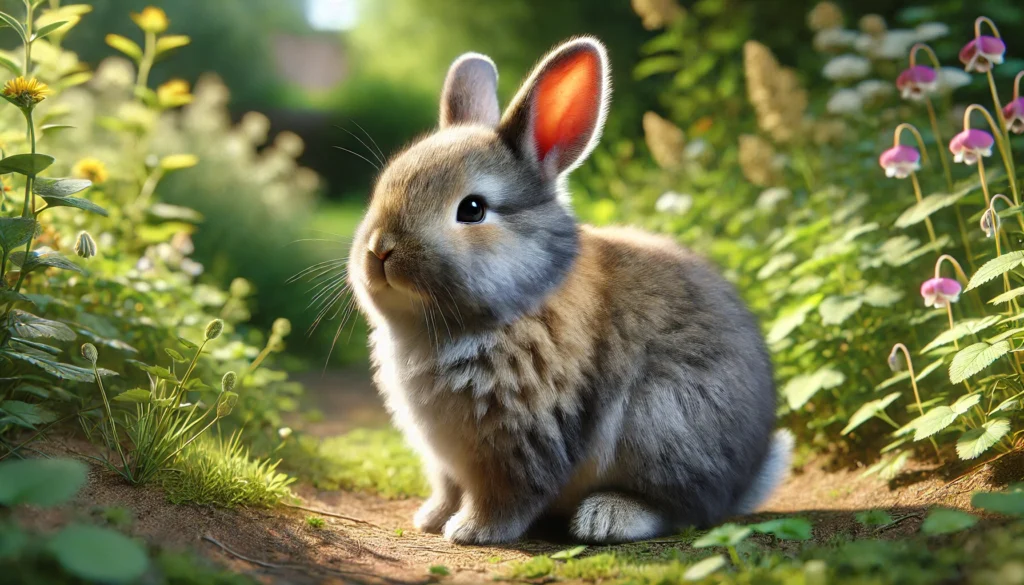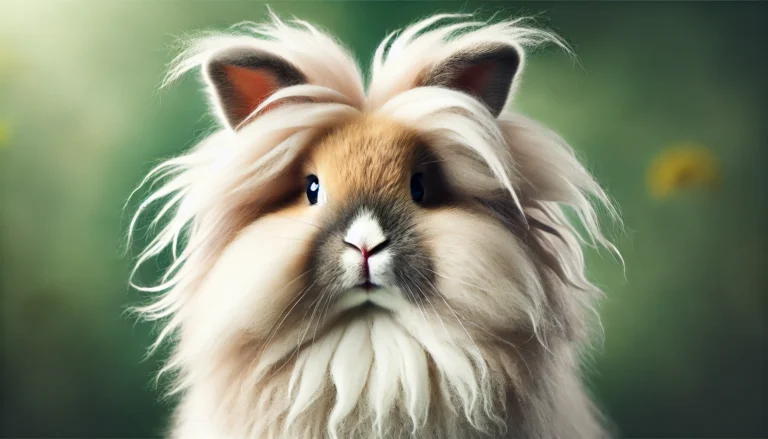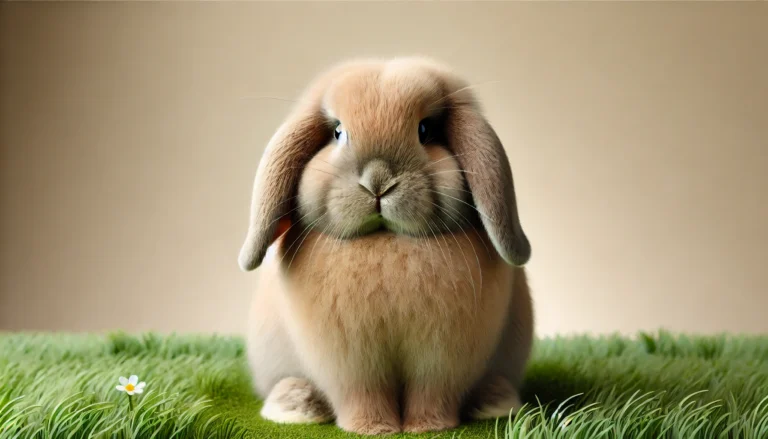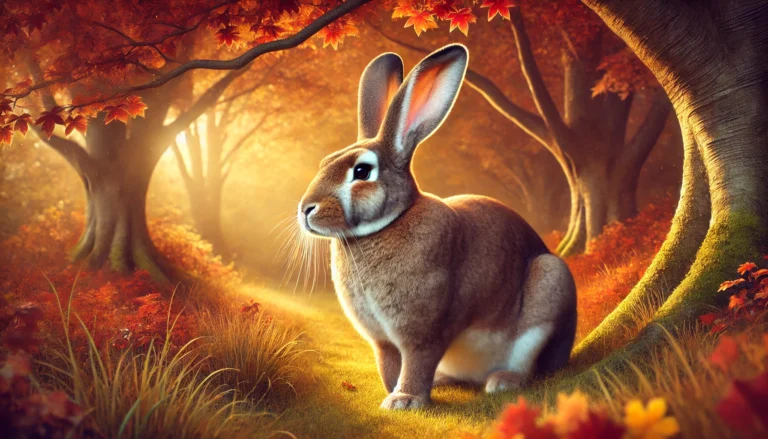Netherland Dwarf Rabbit: The Comprehensive Guide

Introduction to Netherland Dwarf Rabbits
Netherland Dwarf rabbits, commonly referred to as “dwarf bunnies,” are one of the smallest and most popular rabbit breeds. These diminutive rabbits are beloved for their compact size and adorable features, which make them ideal pets for both small and large living spaces. In this article, we delve deep into the world of Netherland Dwarf rabbits, covering their history, care, and everything in between.
The Origin of the Netherland Dwarf Rabbit
The Netherland Dwarf rabbit’s origins trace back to the Netherlands, where breeders initially aimed to create a smaller version of a standard rabbit through selective breeding. The result was the “dwarf bunny,” a breed that maintained the charming characteristics of its larger counterparts but in a much smaller package. This breed’s popularity soared not just due to its size but also due to its wide range of coat colors and patterns.
Physical Characteristics
Netherland Dwarf rabbits, also known as “miniature bunnies” or “dwarf rabbits,” typically weigh no more than 2.5 pounds. Their defining features include a compact body, short face, and ears that stand erect, making them perennially youthful in appearance. The breed boasts various colors and markings, making each bunny distinct.
do you know
The loss of a beloved pet is a deeply emotional experience, and when the time comes to consider pet euthanasia, it can be one of the toughest decisions a pet owner faces. This guide aims to provide a comprehensive overview of pet euthanasia, covering its definition, reasons for considering it, the process involved, emotional implications, legal considerations, and more. By the end, you will have a better understanding of what to expect and how to navigate this challenging time.
Behavior and Temperament
Despite their small stature, Netherland Dwarfs, or “dorf bunnies,” have a reputation for being energetic and playful. However, they can also be shy and require a gentle approach to handling. The temperament may vary from one dwarf rabbit to another; some may be more outgoing, while others are reserved. Their personality makes them suitable for families with older children who understand the need for gentle care.
Housing Needs
Housing for a Netherland Dwarf rabbit, sometimes referred to as “mini rabbits” or “teacup bunnies,” should be spacious enough to allow for free movement and exercise. While they are small, confinement in too small a space can lead to health and behavioral issues. The cage should be equipped with a hideout for privacy, a feeding area, and constant access to hay.

Diet and Nutrition
The diet of a Netherland Dwarf, or “miniature rabbit,” should consist primarily of hay, which aids in digestion and tooth abrasion. Fresh vegetables and a small quantity of pellets can supplement their diet, providing necessary nutrients. Treats should be given sparingly to avoid obesity, which can be a significant health issue for these small bunnies.
Health Care
The Netherland Dwarf’s health is paramount, with a lifespan typically ranging from 7 to 10 years. Common health issues include dental problems due to their small jaws, and digestive ailments. Regular veterinary check-ups can help ensure that your “miniature bunny” remains healthy and happy throughout its life.
Breeding Considerations
Breeding Netherland Dwarfs should be done cautiously due to their size and genetic predispositions to certain ailments, such as malocclusion and digestive issues. Prospective breeders must consider the health of the breeding pair and be knowledgeable about the genetics involved, especially the dwarf gene which can lead to health complications.
Social Needs
Netherland Dwarfs are social creatures and thrive on interaction with their human companions or other rabbits. However, introductions must be done carefully to ensure compatibility and prevent stress. Their social nature means they do not do well in isolation.
Concluding Thoughts
The Netherland Dwarf rabbit, with its endearing appearance and small size, can make a delightful pet for the right owner. They require specific care, but the rewards of owning one of these “miniature bunnies” are immense. By understanding and meeting their needs, owners can ensure their Netherland Dwarf leads a healthy, happy, and fulfilling life.
Are Netherland Dwarf rabbits good pets?
Netherland Dwarf rabbits are excellent pets, particularly for those with limited space due to their small size. They are known for their adorable appearance and gentle disposition. However, they do require careful handling and socialization, as their shy nature can make them skittish. With proper care, including a suitable diet and regular veterinary check-ups, they can become affectionate companions.
Are Netherlands dwarf bunnies cuddly?
Netherlands Dwarf bunnies can be cuddly, especially if they are handled gently from a young age. They tend to form strong bonds with their owners and enjoy being petted and held. However, individual temperaments can vary, and some may prefer less physical interaction. Regular, calm, and gentle handling can encourage them to be more receptive to cuddles.
What are some facts about Netherland Dwarf rabbits?
Netherland Dwarf rabbits are one of the smallest rabbit breeds, typically weighing under 2.5 pounds. They were originally bred in the Netherlands and are known for their wide range of coat colors and compact size. These rabbits have a reputation for being playful and energetic, yet they can be more timid than other breeds, requiring a calm environment.
Are Netherland Dwarf rabbits calm?
Netherland Dwarf rabbits have a gentle nature but aren’t necessarily calm. They can be lively and playful, and some individuals might be nervous or skittish, which requires patient handling. Creating a tranquil home environment and regular, gentle interaction can help soothe a Netherland Dwarf rabbit, making it feel more secure and calm.
What’s the friendliest rabbit?
The friendliest rabbit breed is often considered to be the Mini Lop. Known for their sociable and relaxed nature, Mini Lops typically enjoy human company and are easy to handle. They are affectionate pets that bond well with their owners, making them excellent companions for families and individuals alike.
Are dwarf rabbits smart?
Dwarf rabbits, including the Netherland Dwarf, are quite intelligent. They can be trained to use a litter box, perform tricks, and respond to their names. Their smart nature makes them engaging pets that can learn various behaviors with consistent training and positive reinforcement.
Can Netherland Dwarf rabbits eat fruit?
Netherland Dwarf rabbits can eat fruit, but it should be given in moderation due to its high sugar content. Suitable fruits include apples (without seeds), blueberries, and strawberries, which can be offered in small amounts as occasional treats. Overfeeding fruit can lead to digestive issues and obesity.
Can 2 Netherland Dwarf rabbits live together?
Two Netherland Dwarf rabbits can live together if they are properly introduced and neutered to prevent aggressive and territorial behaviors. Bonding might be easier if they are raised together from a young age. A gradual and supervised introduction is crucial to ensure compatibility and reduce stress.
Can dwarf rabbits live outside?
Dwarf rabbits, including Netherland Dwarfs, can live outside in rabbit-proofed enclosures that protect them from predators, extreme weather, and excessive heat or cold. However, indoor living is generally recommended to safeguard their health and provide closer human interaction, which is beneficial for their well-being.
How many kg is a Netherland Dwarf rabbit?
A Netherland Dwarf rabbit typically weighs around 1 to 1.2 kg (2.2 to 2.6 lbs). This small size makes them popular among those looking for a compact pet that doesn’t require as much space as larger rabbit breeds.
How long do Netherlands dwarfs live?
With proper care, Netherland Dwarf rabbits can live for 7 to 10 years. Their lifespan can be influenced by factors such as diet, housing, and regular veterinary care. Providing a safe, clean, and stimulating environment can help maximize their longevity.
Do Netherlands dwarf rabbits have health problems?
Like all breeds, Netherlands Dwarf rabbits are prone to certain health issues, including dental problems due to their small jaws and digestive ailments. Regular health checks and a proper diet are vital to managing and preventing these issues.
Which is better male or female Netherland Dwarf rabbit?
The choice between a male or female Netherland Dwarf rabbit depends on personal preference and the individual rabbit’s temperament. Both sexes require neutering to prevent reproductive diseases and reduce territorial and aggressive behaviors. Generally, there is no significant difference in temperament between neutered males and females.
Do Netherlands dwarf rabbits smell?
Netherlands Dwarf rabbits themselves do not smell, but their living environment can become odorous if not cleaned regularly. Proper sanitation of their living space and regular grooming will prevent any bad smells.
How much food should a dwarf rabbit eat?
A dwarf rabbit’s diet should primarily consist of hay, supplemented with a small amount of pellets and fresh vegetables. Generally, a dwarf rabbit should eat a pellet portion that measures about 1/8 to 1/4 cup per day, depending on their weight and health needs. Fresh water should always be available.
Can I leave my rabbit alone for 2 days?
Leaving a rabbit alone for two days is not ideal. Rabbits require daily care, including fresh food and water, and their litter needs to be cleaned regularly to prevent health issues. If you need to be away, it is crucial to have a trusted caretaker to check on your rabbit at least once a day. This person should provide fresh food and water, clean the cage, and observe the rabbit for any signs of illness or distress. Rabbits can become stressed when their routine changes, which can impact their health, so having someone familiar to the rabbit can help minimize this stress.
Do dwarf rabbits sleep?
Dwarf rabbits do sleep, although their sleeping patterns might be different from what humans expect. Rabbits are crepuscular, meaning they are most active during the twilight hours of dawn and dusk. They often take multiple short naps throughout the day and night. In a safe and comfortable environment, a dwarf rabbit will sleep deeply, often lying on their sides or curling up. A comfortable hiding spot in their cage, like a small house or shelter, can make them feel secure enough to sleep deeply.
What age to breed a Netherland Dwarf?
Netherland Dwarf rabbits can be bred once they reach sexual maturity, which is typically around 4 to 6 months old for females and slightly later for males. However, many breeders prefer to wait until they are at least 6 to 8 months old to ensure they are mature enough to handle the stress of breeding and motherhood. It is essential to consider the health risks and responsibilities involved in breeding, as Netherland Dwarfs can have complications due to their small size and unique genetic traits. Consulting with a veterinarian experienced in rabbit care before breeding is advisable.
Can rabbits sleep alone?
Rabbits can sleep alone, but they are naturally social creatures who thrive in the company of their own kind. A lone rabbit can be fine if it gets plenty of human interaction and mental stimulation. Without a companion, it’s crucial to ensure that the rabbit has enough space to exercise, explore, and play. Providing toys, puzzles, and regular interaction can help keep a single rabbit healthy and mentally stimulated. However, if considering a companion, ensure both rabbits are spayed or neutered to avoid aggressive and territorial behavior.
How long do indoor rabbits live?
Indoor rabbits typically live longer than outdoor rabbits due to the controlled environment, which reduces exposure to predators, harsh weather, and diseases. The average lifespan of an indoor rabbit can be anywhere from 8 to 12 years, with some rabbits living even longer under optimal care. Factors that contribute to a long life include a nutritious diet, regular veterinary care, a safe living environment, and daily exercise and mental stimulation.
Can I keep a rabbit in a cage?
While a rabbit can be kept in a cage, it should be spacious enough to allow for separate areas for sleeping, eating, and eliminating. The cage should also accommodate multiple toys and activities to prevent boredom. Rabbits need several hours of exercise outside the cage each day in a rabbit-proofed area. Continuous confinement can lead to physical and mental health problems, including obesity, muscle wastage, and behavioral issues. Thus, a cage should only be part of a rabbit’s living environment.
Do rabbits need light at night?
Rabbits do not require light at night. In fact, having a dark period is essential for their health as it mimics their natural environment and helps maintain their circadian rhythm. Excessive light at night can stress rabbits and disrupt their sleep patterns. If safety is a concern, a small night light can be used, but it should not be too bright and should ideally simulate moonlight rather than artificial light.
Do rabbits recognize their owner?
Rabbits do recognize their owners. They are capable of forming strong bonds with humans and can recognize them through various cues such as voice, sight, and smell. Rabbits often show their affection by following their owners around, sitting close to them, and may express excitement when their owner arrives home. Consistent and gentle handling can enhance this recognition and bonding process, making rabbits responsive and affectionate pets.




